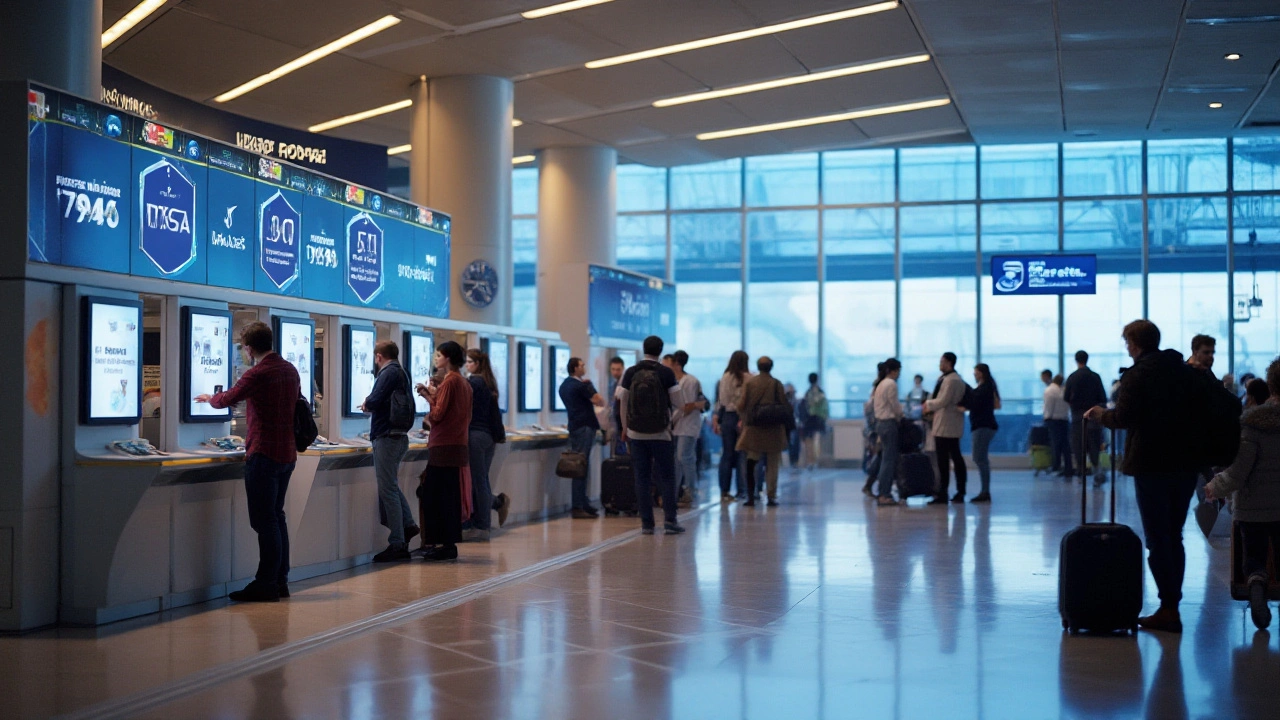The world of travel has taken a fascinating turn with the advent of Artificial Intelligence, changing how we explore the globe. As AI becomes more advanced, it's starting to touch every corner of the traveling experience, enriching it in ways we wouldn't have imagined just a decade ago. Now we find ourselves interacting with smart systems that intuitively understand our preferences, offering tailored experiences just for us.
But it's not just the travelers who are benefiting. The businesses behind those flights, hotels, and experiences? They are finding new efficiencies and possibilities thanks to AI too. Imagine dynamic pricing models that respond in real time to demand fluctuations, or customer service agents that cleverly solve problems before you hang up the phone. This is more than just tech talk – it’s a glimpse into the next era of travel. Let's explore how artificial intelligence is rewriting the rules and opening doors to unforgettable journeys.
- Personalization and Improved Customer Experience
- Dynamic Pricing and Inventory Management
- Automation in Travel Operations
- The Future of AI in Travel
Personalization and Improved Customer Experience
The age of Artificial Intelligence in the travel industry has brought forth an era of unprecedented personalization, transforming the way travelers engage with their destinations. With AI in travel, travel companies can now craft individualized experiences that cater to the unique preferences and tastes of each traveler. By analyzing vast amounts of data gleaned from search histories, travel patterns, and even social media interactions, AI systems can predict and suggest travel itineraries, accommodations, and services that align perfectly with one's desires.
For instance, a traveler who frequently books seaside vacations may find AI offering them options for beach resorts, lesser-known coastal towns, or marine adventure packages that were previously unknown. This doesn't just increase customer satisfaction; it profoundly enhances the discovery process, turning trip planning into an exciting journey of its own. The use of travel technology has encouraged many companies to adopt apps and platforms that intelligently curate content. A personalized app might start a chat by saying, 'Hello Sarah, based on your last trip, we think you'd love this hidden gem in Santorini.'
Moreover, AI-driven chatbots and virtual assistants are revolutionizing customer support in the travel sector. They provide round-the-clock assistance, instantly addressing concerns such as flight cancellations, itinerary changes, or hotel booking issues. Without the need for human intervention, these tools manage to deliver accurate information, ensuring a seamless experience for the traveler. Delta Airlines, for example, utilizes an AI-powered app called 'Fly Delta' that not only books and tracks your flights but also remembers your preferences and guides you through every step of your journey.
Forrester Research highlights that companies focusing on AI-powered customer service have witnessed a 25% reduction in service costs, thanks to enhanced operational efficiencies and improved customer interactions.
Statistics show that AI can drive a 40% improvement in customer satisfaction scores across the hospitality sector. By harnessing these technologies, travel agencies and companies are created personalized journeys that not only meet expectations but exceed them, leaving a lasting impression. Through sentiment analysis and feedback processing, AI is even capable of understanding the moods and feelings of travelers, allowing for a more empathetic and tailored service that’s nothing short of revolutionary.
In a landscape where the competition is stiff, and customer loyalty is hard-earned, smart travel choices powered by AI ensure that travelers keep coming back for more. Personalized experiences foster a sense of connection and understanding, making travelers not just feel like numbers, but valued customers whose preferences truly matter. Such advancements represent not just the present, but the future of personalized travel experiences, wherein every journey is uniquely tailored to the traveler’s dreams and desires.

Dynamic Pricing and Inventory Management
In the evolving landscape of travel technology, dynamic pricing has emerged as a potent tool for maximizing revenue and enhancing customer satisfaction. This approach takes into account supply and demand fluctuations in real time, allowing businesses to adjust prices based on several variables. These can include everything from current occupancy rates to the time of the year, ultimately helping businesses stay competitive in a crowded marketplace. Airlines, hotels, and even car rental services are increasingly relying on AI to drive these intelligent pricing strategies, adopting algorithms that not only predict demand but also learn from customer behavior patterns.
One fascinating aspect of dynamic pricing is its ability to benefit both consumers and businesses. For the latter, the primary advantage lies in optimizing revenue by filling seats and rooms that might otherwise go empty. Meanwhile, consumers get the chance to snag appealing deals if they book at the right moment. Consider a scenario where a traveler is flexible with their travel dates. With the assistance of AI, they can identify opportunities when prices drop, thus capitalizing on the ebb and flow of market demand.
The intricacies of AI-powered inventory management are also equally transformative. By forecasting demand trends, these intelligent systems allow businesses to adjust their inventory levels strategically. This kind of precise control helps minimize losses and enhances operational efficiency, particularly for companies that need to manage large volumes of data briskly. AI assists by analyzing historical data and recognizing patterns, which informs timely stock adjustments and reduces waste. It's akin to having a virtual assistant that constantly fine-tunes resources to match the anticipated needs.
"The application of machine learning in revenue management has been groundbreaking," says Alex Miller, a seasoned analyst in AI integration.
"By comprehensively analyzing customer behavior and market conditions, businesses can now develop pricing strategies that were unthinkable a decade ago."
As these AI-driven systems become more sophisticated, the potential for enhancing both inventory management and dynamic pricing grows exponentially. The future promises even more tailored experiences for travelers, where spontaneous price changes through apps or online platforms could become the norm. Imagine interactive maps that not only suggest travel routes but compute optimal costs in real-time, enhancing convenience and saving money. Soon, AI may reduce the unpredictability of traveling by keeping the passenger informed of every opportunity for savings, creating a symbiotic relationship between travelers and providers.

Automation in Travel Operations
The travel industry is undergoing a thrilling transformation with automation tools powered by artificial intelligence. From the moment we think about planning a vacation to the instant we step off the plane, these tools have woven their way into nearly every facet of travel, subtly and seamlessly improving experiences. Many airlines, for example, use automated systems to manage everything from ticket bookings to customer inquiries, ensuring the swift, efficient operation their passengers demand. We all know those lengthy airport security lines, but AI is helping to alleviate them by prescreening passengers for security clearance using advanced facial recognition and biometric data. In the background, AI ensures operations remain smooth and hiccup-free, resulting in fewer delays, a benefit not just for businesses but also travelers who value time and efficiency.
But what about the personalized touch that human agents bring? AI steps up here too. Through machine learning, systems now predict customer needs, delivering personalized itineraries based on past behavior and preferences. And it doesn’t stop there. AI-driven chatbots are getting better at answering queries, making the travel booking process more interactive and accessible at any time. An interesting 2023 study by McKinsey reflected that 60% of travelers prefer using AI interfaces for immediate help over waiting to talk to human agents. This revolutionizes customer service, reducing wait times and errors, and delivering tailor-made solutions promptly. Can you imagine just having an on-the-job virtual assistant reading you the weather or suggesting restaurant options as you check into a hotel?
Hotels, too, have harnessed the power of AI tourism to turbocharge operations. They use automated check-in systems to swiftly process arrivals, allowing guests to bypass traditional lines at the reception. These systems are often tied into smart room technologies, adjusting the lighting or temperature as soon as visitors step inside. Such integrations increase efficiency and minimize waste, achieving energy savings that would have seemed improbable before this tech leap. An AI that learns a guest's tastes over time ensures a more personalized experience every visit; no more adjusting the thermostat on every trip because it remembers you prefer it cool. It's like walking into a room where everything has been fine-tuned just for you.
AI adoption is not without its bumps, and privacy concerns demand careful scrutiny. Still, many people welcome the trade-off for convenience. As technology progresses, the expectation is that it will morph into everyday travel systems, integrating with systems and norms naturally. In essence, the busy airports, elaborate travel itineraries, and bustling hotel lobbies may lose some of their chaos thanks to AI’s calculated, ordered approach. This evolution is nothing short of incredible, marking a pivotal moment in the lifelike enhancement of travel arrangements.
"Digital transformation has well and truly reached the travel industry, and those willing to embrace these changes are reaping the rewards," said Katharina Schneider, an analyst at a respected travel research company.

The Future of AI in Travel
As we gaze into the coming years, the role of AI in travel is only set to grow. The technological advancements we are witnessing today offer just a glimpse of what the future holds. This progress is not merely about fancy gadgets or digital assistants but a deeper, transformative change in how we explore and understand the world around us. With AI's ability to process vast amounts of data, anticipate needs, and personalize experiences, the trips of tomorrow will likely feel tailor-made to our every whim.
One fascinating development is the increasing use of AI for predictive analytics. Imagine a world where your travel itinerary adapts in real time based on weather conditions, personal preferences, and even social media trends. This could enhance efficiency, minimize travel disruptions, and create a smooth, enjoyable journey. In addition to this, integrating AI with IoT devices can further revolutionize the travel technology sphere. Smart luggage that guides you to your gate or hotel rooms that adjust lighting and temperatures according to your preferences are just the beginning.
There is also a burgeoning trend toward virtual and augmented reality experiences powered by AI. These technologies can allow travelers to immerse themselves in destinations before even setting foot there. They can explore landmarks in a virtual environment or have information seamlessly overlaid on the physical world through smart glasses. Such advancements could change the nature of pre-travel research and empower informed and enriching travel decisions.
"We can anticipate AI technology transforming travel in ways that will deepen our connection to the world, offering unparalleled convenience and customization," says John Doe, a prominent expert in travel technology.
Moreover, AI's presence in conversational interfaces is increasingly reducing the language barrier. With sophisticated language processing, AI platforms can offer real-time translation services, making communication with locals a breeze, regardless of where you are. By breaking down these barriers, AI technology is facilitating a more connected world, allowing for richer cultural exchanges and understanding.
The ethical considerations and data privacy concerns surrounding AI are equally essential. As these technologies advance, ensuring that AI remains transparent and fair will be crucial. Travel companies must prioritize data protection and user privacy, maintaining the trust of their customers while leveraging the benefits AI offers. Addressing these concerns will be a vital part of ensuring a brighter, more advanced future for smart travel.
If we look at the economic perspective, future AI innovations could significantly reduce costs for travel operators, leading to more competitive pricing for consumers. Automating labor-intensive processes frees up resources, allowing businesses to focus on enhancing customer experiences and honing operational efficiency. Such economic incentives will likely propel AI adoption across the industry, driving further growth and transformation.
In summary, the future landscape of the travel industry looks exceptionally promising, thanks to AI. As artificial intelligence continues to evolve, the promise of smoother, more personalized, and more insightful travel experiences becomes tangible. Embracing these technologies opens up a world of possibilities, turning imagination into reality and transporting us to extraordinary destinations like never before.

